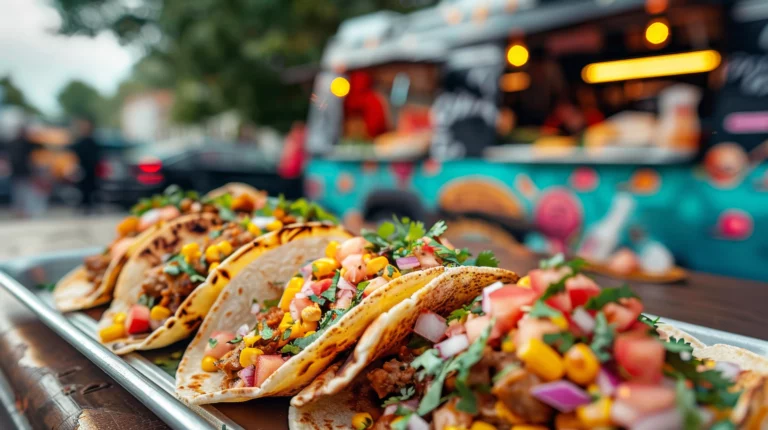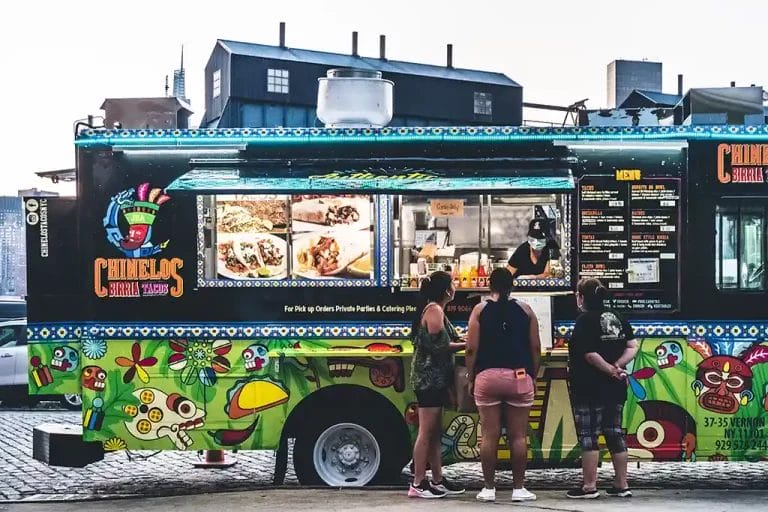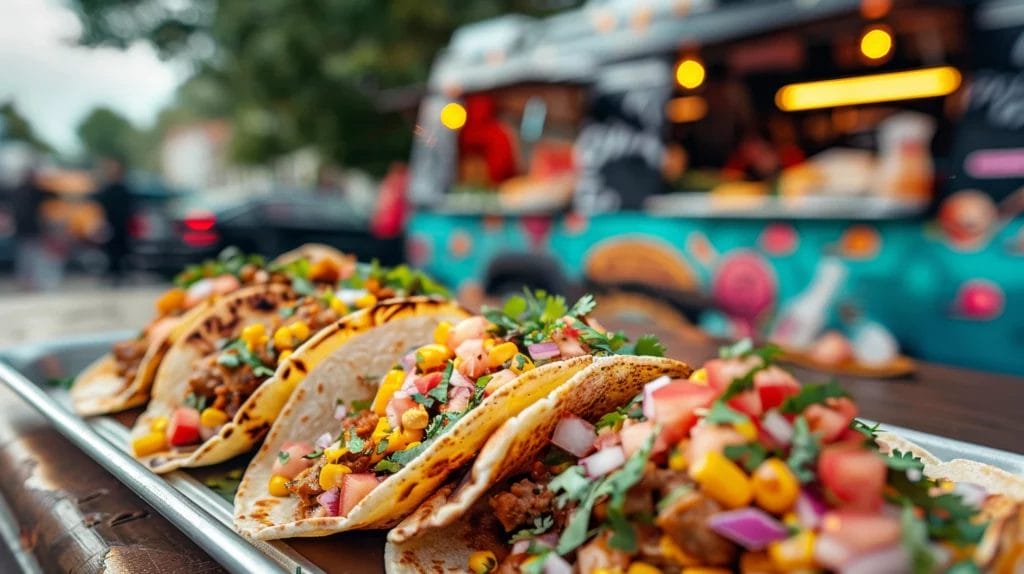To start a food truck in Florida, you need to establish your business entity and apply for several licenses, including a business license and food permit. You’ll also need to purchase a new or used food truck and all of the necessary equipment and supplies.
Whether you’re cooking Cuban sandwiches in Tampa or mixing up walking tacos in Tallahassee, food trucks are a booming business in Florida. Thanks to the warmer climate, robust tourism, and diverse population, the Sunshine State is the perfect place to pursue your mobile food dreams.
Food Truck Requirements in Florida
Before you start submitting applications for licenses and permits, you’ll have to complete some prep work for your business.
Business Requirements
Florida food truck laws require business owners to complete several steps before applying for licenses and permits:
- Business name: The name under which you’ll operate and file all business documents.
- Business classification: Your business classification, or structure, determines licensing and tax requirements.
- Employer identification number (EIN): Register with the IRS online to get your EIN. You’ll need this for taxes, business banking, contract work, and more.
- Business plan: To get a food truck permit in Florida, you need a proof of concept for your business.
- Certificate of Insurance (COI): Florida requires businesses to show proof of food liability insurance before approving permits.
Commissary Requirements
Mobile Food Establishments (MFEs) must have an agreement with a commissary. A commissary is an approved establishment — like a commercial kitchen or grocery store — where food trucks and other MFEs prepare food, store stock, and maintain their vehicles.
Florida food truck laws require you to use a commissary if you cannot meet health and safety standards with your truck alone. You may be required to use a commissary if you don’t have:
- Adequate cold storage and shelving
- A three-compartment sink
- A large enough water supply and wastewater tank
- Restroom facilities
- Cooktops or ovens
You will need a Commissary Letter of Agreement at the time of your food truck health inspection to prove you meet the state requirements.

Food Truck License in Florida
Florida food truck owners need to apply for several permits and licenses to operate legally at the state and local levels.
Regulations vary between counties and cities, so take time to check with your local agency. Municipal licenses, health permits, and parking passes can all vary depending on your location.
- Makes your business a distinct legal entity separate from your personal affairs.
- Cost: $87.50–$160
- Where to get it: Florida Department of State
- Certifies that your food truck has the required health and safety fixtures and equipment.
- Cost: $50 application fee + $178.50 for half-year license or $347 for full-year license
- Where to get it: Mobile Food Dispensing Vehicle License
- Specifically for food trucks serving raw or prepackaged foods. Operators must apply at least 21 days before opening.
- Cost: $50–$350 (varies by city and county)
- Where to get it: Food Permit Center
- Businesses that sell taxable goods or services must register to collect, accrue, and remit taxes to the state of Florida.
- Cost: Free
- Where to get it: Florida Department of Revenue
- You typically can’t sell alcohol from food trucks in Florida, though some areas may grant temporary licenses for special events.
- Cost: $25–$100
- Where to get it: The Division of Alcoholic Beverages & Tobacco
- Required to drive your food truck to events and approved parking areas.
- Cost: $48
- Where to get it: Florida Highway Safety and Motor Vehicles
Florida Food Truck Laws
Florida food truck regulations vary by local municipality and zoning laws. However, health and safety inspectors will typically check these key areas of your business:
- Refrigeration: Set to 40° F for cold foods, 0° F for frozen items.
- Food storage: Food stock should rotate on a first in, first out (FIFO) basis and be stored away from direct sunlight and cleaning chemicals.
- Sanitation: All surfaces that touch food should be sanitized regularly. Employees must wash their hands frequently.
- Labeling: Food items require clear labels that include their name, expiration date, open date, and ingredients.
- Sinks: All units need a three-compartment sink or dishwasher for cleaning cookware and utensils, plus a separate handwashing sink.
- Fire prevention: Grease traps should be cleaned regularly, and food trucks must have an approved fire suppression system.
- Water: The potable water tank must be at least 30 gallons and the wastewater tank needs to have 50% more capacity than the clean water tank.
Always check with your local government offices for food truck laws and requirements in your area.
Food Truck Insurance in Florida
Many Florida cities require food trucks to carry commercial auto and general liability insurance. Even if your area doesn’t require it, the state recommends you protect your business with the appropriate coverage.
Serving and selling food comes with many liability risks, such as:
- Food poisoning
- Bodily injury
- Property damage
Food truck insurance covers these common claims so that you don’t have to pay out of pocket if an accident occurs. While the cost of food truck insurance may slightly increase your overhead expenses, your coverage could pay for itself after a single claim.

Cost of Starting a Food Truck in Florida
Aside from licenses, fees, and other overhead costs, you’ll need to purchase the essentials for your food truck operation.
- Food truck
- New: $125,000–$200,000
- Used: $40,000–$80,000
- Cooking equipment
- Grill/griddle: $300–$3,000
- Deep fryer: $200–$4,000
- Oven: $500–$15,000
- Refrigeration
- Refrigerator/freezer: $2,000–$5,000
- Prep table: $2,000–$5,000
- Safety and Sanitation
- Commercial sink: $400–$1,000
- Handwashing sink: $100–$300
- Fire suppression system: $3,000–$8,000
- Technology
- Point of Sale (POS) system: $500–$2,000
- Inventory software: $50–$500
You also need to take food costs into consideration. Carefully plan your food pricing strategy to get the most out of your budget, and take care to develop a menu that includes popular food truck items since they are most likely to sell.
Florida Food Truck Festivals
Once your paperwork is filed, the fees are paid, and your food truck is ready to roll, you can start participating in food festivals, fairs, and special events. Florida’s temperate climate makes it easy for food trucks to operate year-round, providing ample opportunities to get out there and serve your best dishes!
Build connections in your community and research local events to get your food truck into festivals. Not sure where to start? Check out these popular food truck-friendly events throughout Florida:
FAQs About Starting a Food Truck in Florida
Can I Park My Food Truck Anywhere in Florida?
No, in Florida, food trucks can only park in designated areas determined by the local government agency. Most cities have zoning regulations for food trucks with specific parking rules and commercial areas where they can operate.
Mobile food vendors also need to park a minimum distance from brick-and-mortar restaurants.
What Are the Fire Safety Requirements for Food Trucks in Florida?
- A portable fire extinguisher
- A fire suppression system
- Adequate ventilation
- Properly installed appliances
- Safe fuel storage
- Regular safety inspections
Contact your local fire station for all of the requirements for your area.

Lindsey Fliger
Ohio-based copywriter Lindsey Fliger leverages her experience as a lifelong foodie, dedicated home chef, and very decent baker. She holds a bachelor’s in English from Kent State University and a master’s in English Literature from The University of Akron. Before Veracity, she wrote about everything from kitchen tools to decadent wines at Zulily.
Ohio-based copywriter Lindsey Fliger leverages her experience as a lifelong foodie, dedicated home chef, and very decent baker. She holds a bachelor’s in English from Kent State University and a master’s in English Literature from The University of Akron. Before Veracity, she wrote about everything from kitchen tools to decadent wines at Zulily.
JoAnne understands that starting and operating a business takes a tremendous amount of time, dedication, and financial resources. She believes that insurance is the single best way to protect your investment, business, and personal assets.


